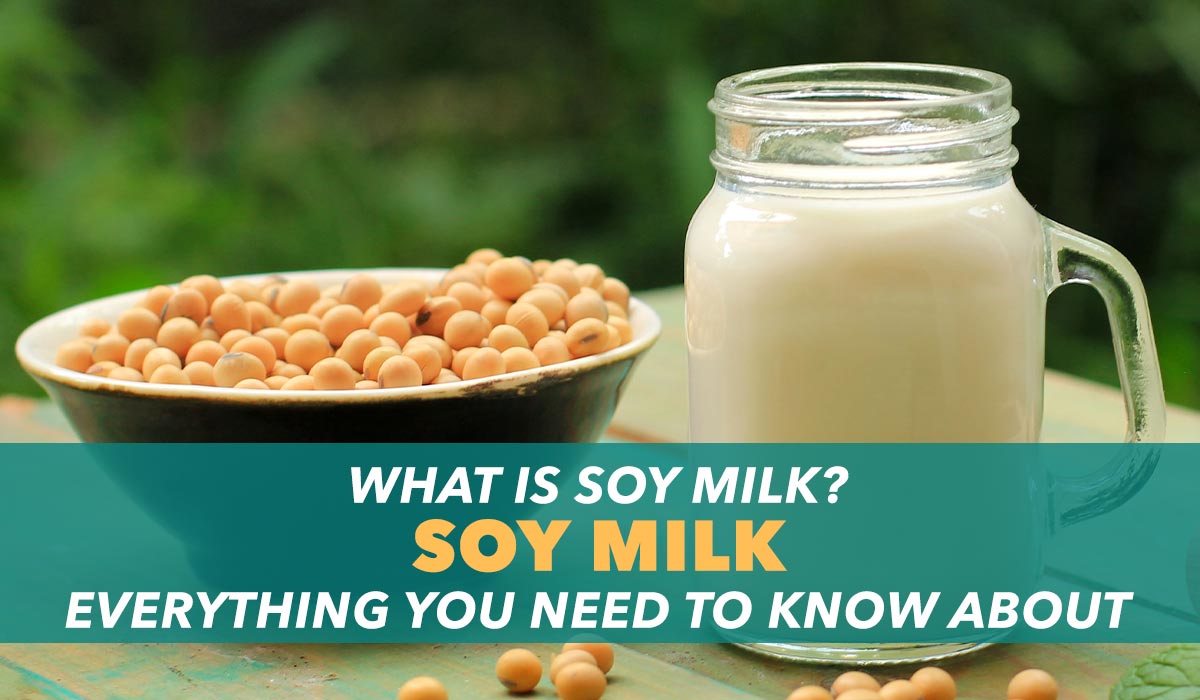Are you looking for a dairy-free alternative to cow’s milk? Look no further than soy milk! Are you wondering what is soy milk? What is soy milk made from? It is made from whole soybeans or protein isolate, a plant-based alternative rich in protein, healthy fats, and essential vitamins and minerals. Not only is it an excellent option for those with lactose intolerance or dairy allergies, but it also has potential health benefits for heart health and reducing the risk of certain cancers.
Imagine enjoying all the deliciousness of cow’s milk, such as in your morning coffee or bowl of cereal, without any adverse side effects. Many people are curious about what is soy milk and how it compares to cow’s milk in terms of nutrition. It is a versatile ingredient used in cooking, baking, and even making non-dairy ice cream and cheese. Plus, it’s easy to find at most supermarkets and health food stores.
Don’t miss out on the benefits and versatility of soy milk. Give it a try and see why it’s becoming popular for those looking for a dairy-free alternative.
Here, we will discuss soy milk facts, from its nutritional profile to its many health benefits.
Contents
- What is Soy Milk Meaning?
- Common Soy Milk Ingredients
- History Of Fermented Soy Milk
- How To Make Soy Milk?
- Nutrients in Soyabean Milk
- Ways to Include Soy Milk in Your Diet
- Advantages of Soy Milk
- Disadvantages of Soy Milk
- Is It Safe To Drink Soy Milk?
- Who Should Avoid Soy Milk?
- Conclusion
- Frequently Asked Questions
What is Soy Milk Meaning?
What is soy milk’s role in a plant-based diet? Soy milk contents include, protein, healthy fats, essential vitamins and minerals, and other components such as carbohydrates and fibers, depending on the best soy milk brands and the method of preparation. When preparing, soaked soybeans are combined with water, and the solids are strained out to reveal a smooth, milk-like liquid. You can buy both the sweetened and unsweetened varieties. Generally speaking, the unsweetened varieties only contain pure water and soybeans, though some soy milk brands may also include salt, vitamins, and/or minerals.
A sweetener, typically cane sugar, is present in the sweetened varieties. They frequently add oil, salt, and vanilla to give the food a taste reminiscent of cow’s milk. To provide them with a chocolate flavor, some versions also include cocoa. A thickener or stabilizer is also present in some sweetened and unsweetened milk. These additions support the milk’s constituents’ ability to maintain the emulsion, or uniform mixture, that gives it its thicker texture and mouthfeel. But is soy milk a dairy product? No, it is not a dairy product, as it is made from soybeans, not from animals.
Common Soy Milk Ingredients
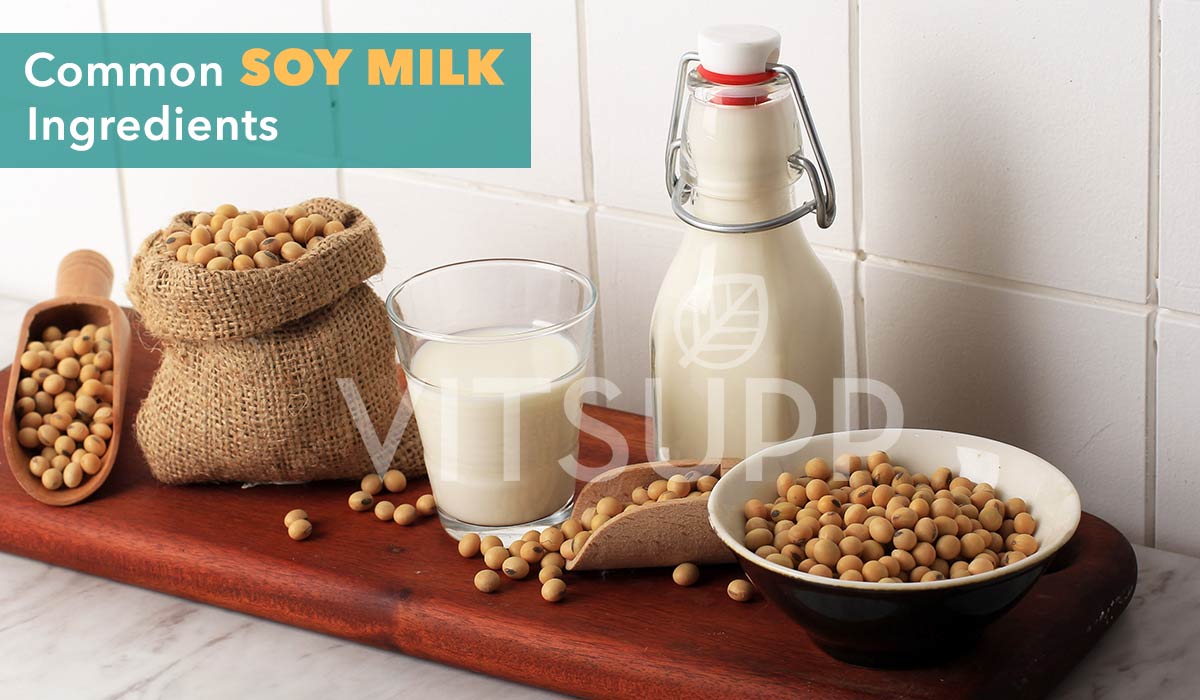
Soy milk meaning refers to a plant-based milk alternative made from whole soybeans or soy protein isolate. It is typically caused by soaking, grinding, boiling soybeans, and separating the solids from the liquid. When learning about different types, it’s essential to understand what is soy milk and how it’s made. Some common ingredients include:
- Soybeans: The main ingredient is protein and other nutrients.
- Water: Used to blend the soybeans and create a milk-like consistency.
- Sweeteners: Some of these contains added sweeteners, such as sugar or honey, to improve the flavor.
- Emulsifiers: such as lecithin, help to stabilize the milk and prevent separation.
- Vitamin and Mineral Fortification: Some kinds are fortified with vitamins and minerals, such as calcium and vitamin D, to improve the nutritional profile.
- Flavors : Some types are flavored with vanilla, chocolate, or other flavors.
It is important to read the label when purchasing, as soy milk ingredients can vary depending on the brand and type of product. Some may also contain additives or preservatives. To know more about different minerals and nutrients, read the blog.
History Of Fermented Soy Milk
The practice of fermenting soy milk has its roots in ancient China. This process helped them to preserve the milk while multiplying its nutritional value. The traditional fermented soy milk had a texture similar to yogurt. What was initially developed for lactose-intolerant individuals eventually turned out to be one of the most popular dairy-free beverages in the present time.
The Buddhist monks in China used to follow a vegan diet. As they wanted to look for an alternative to dairy milk, they leaned on soyamilk, which is plant-based. Slowly, fermented soy milk arrived in Japan through these monks. Daily consumption improved digestion power and gut health, so it became a key part of the Buddhist temple cuisine. In the 1930s, this product was commercialized for the first time in Japan. Fermentation increased the bioavailability of soy milk nutritional info, such as protein. The healthy food movement in the West boosted the inclination towards vegan and lactose-free sources of probiotics, i.e., fermented soy milk. After going through various cultures, this Asian staple is now aiding the dietary needs of individuals.
How To Make Soy Milk?
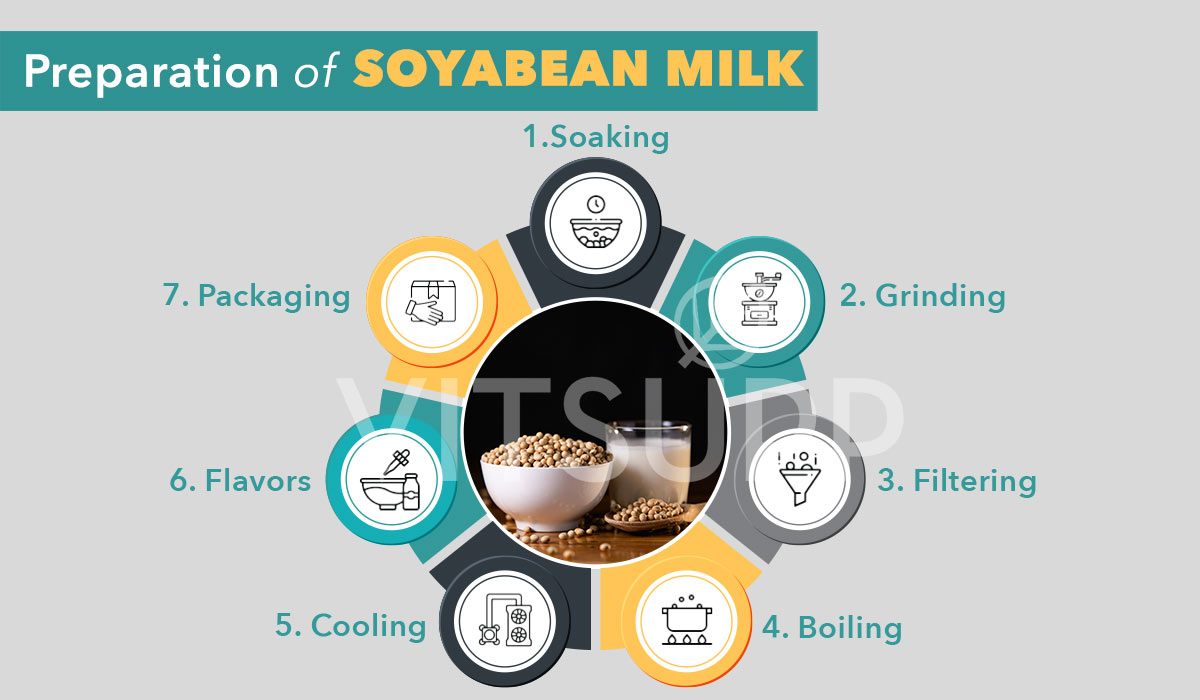
For those with lactose intolerance or dairy allergies, understanding what is soy milk and its benefits is crucial. How is soy milk made? Preparation of soy milk involves soaking, grinding, and boiling whole soybeans, then separating the solids from the liquid to create a creamy-like consistency. The soy milk process involved in the preparation of milk can vary based on the production. Let us take a closer look at each of the steps.
- Soaking: The soybeans are soaked in water for several hours to soften them and make them easier to grind.
- Grinding: The soaked soybeans are ground into a fine paste using a blender or food processor.
- Filtering: The ground soy paste is filtered through a fine mesh to remove any remaining bits of soybean.
- Boiling: The filtered solution is then boiled for 15-20 minutes to remove any remaining enzymes that could make it indigestible.
- Cooling: After boiling, the solution is cooled to room temperature before being packaged or used in further processing.
- Adding Flavors: Flavors, sweeteners, and other ingredients can be added at this point.
- Packaging: The final product is packaged in aseptic packaging to keep it fresh and prevent the growth of harmful bacteria.
Nutrients in Soyabean Milk
Soy milk is a healthy beverage because soybeans are a source of many different nutrients. Considering Soy milk vs almond milk, while both are popular plant-based alternatives, protein in soymilk is higher, while almond milk is lower in calories. Let us take a look at the nutritional value of soy milk.
The nutrients in soybean milk of 1 cup (240 mL) of unsweetened milk have the following.
- 80 calories
- 4 grams of fat
- 4 grams of carbohydrates
- 7 grams of protein
Numerous well-known brands have added vitamins and minerals like calcium, riboflavin, and vitamins A, B12, and D.
Magnesium, folate, zinc, and vitamin B6 are all commonly found in unsweetened, unfortified milk; some brands also contain vitamin K and iron.
Cane sugar is typically used in sweetened varieties, which provide 5–15 grams of added sugar per serving.
Many people think that plant-based products shouldn’t be named with standard dairy terms like milk or yogurt because doing so could imply that they are nutritionally equivalent to products made from cow’s milk.
However, considering that fortified milk has similar amounts of calories, fat, vitamin D, calcium, and potassium to low-fat cow’s milk, it might not be so absurd. These are some of the common soy milk nutrition facts.
Ways to Include Soy Milk in Your Diet
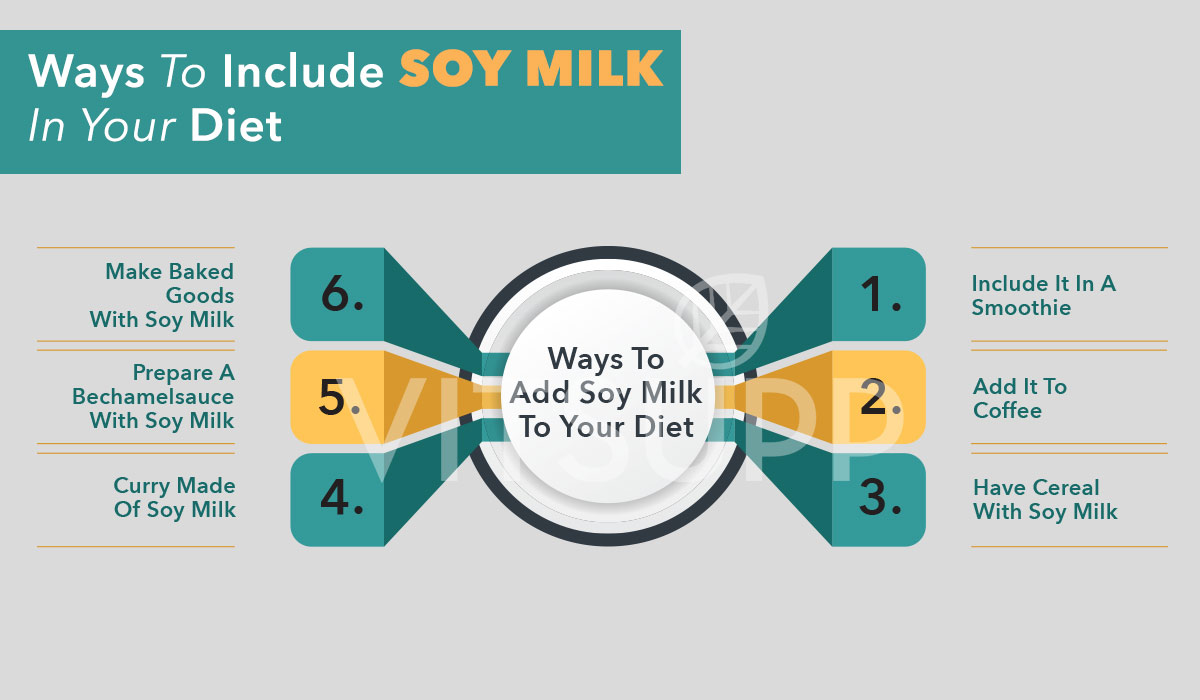
You can prepare soya milk at home or buy it in supermarkets, natural food stores, and restaurants.
Soybeans should be soaked in water for 10 ounces for a night. After that, boil these beans in 12 cups of water for ten minutes. After blending the water and soybeans to a smooth consistency, simmer the mixture for an additional 40 minutes. You can taste it first and, if you’d like, add a little salt or sugar. There are specific soya milk side effects, but overall, it is good for our health.
After the soybeans have finished simmering, strain the mixture through cheesecloth to eliminate the solids. It can be stored for up to a week, comparable to how long dairy milk keeps. Is soy milk good for health? Many studies suggest that it may have potential health benefits, such as reducing the risk of certain cancers and promoting heart health.
There are several benefits of drinking soy milk daily, and because of that, you can incorporate it into your diet in the following ways:
- Including it in a smoothie
- Adding it to coffee
- Consume cereal and soybean milk.
- Make baked goods.
- With soybean milk, prepare a bechamel sauce.
- Curry made with soybean milk.
Try these soymilk-based recipes.
Advantages of Soy Milk
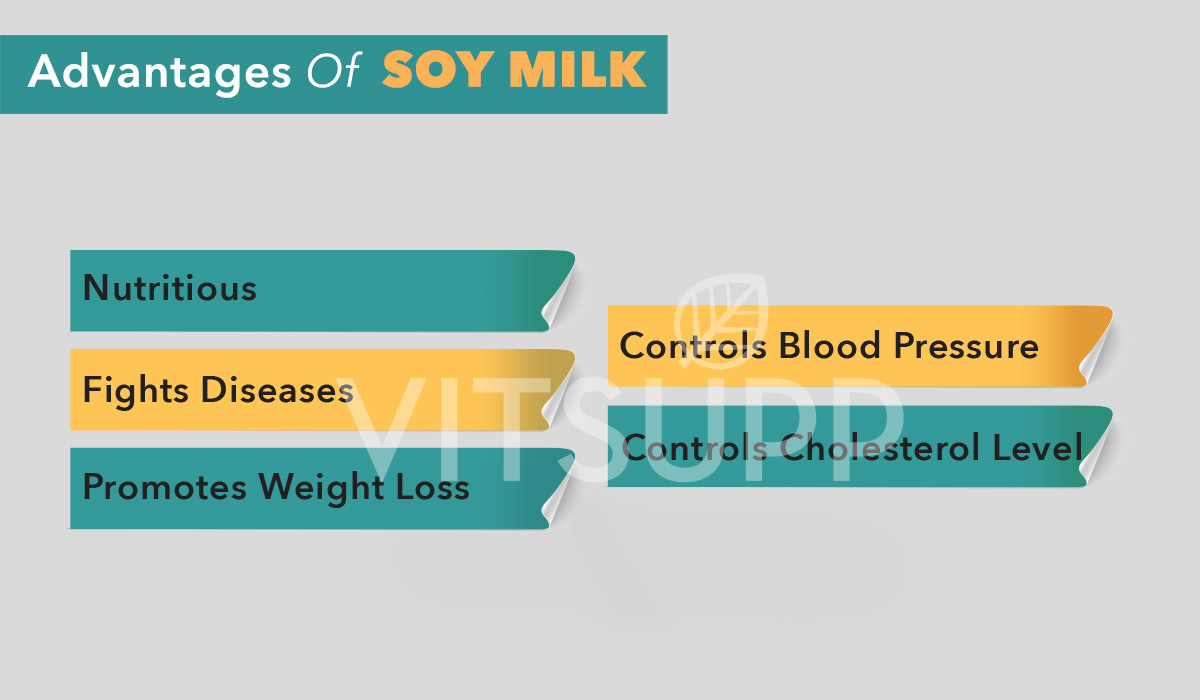
Here are some potential soy milk benefits. Most of it is because of including this milk on your grocery list. Soy milk health benefits include being a good source of protein, healthy fats and essential vitamins and minerals, and it may also have potential health benefits such as reducing the risk of certain cancers and promoting heart health.
Let us take a look at the advantages of soy milk.
1. Soy Milk is Nutritious
It is a plant-based product. It is popular among those looking for alternatives to milk-based products. But is soy milk healthy? Well yes! It is nutritious as it is rich in protein and has less saturated fat. There are several benefits of soy milk for females.
It contains many of the same nutrients found in cow’s milk, including protein, calcium, and vitamin D. It also has other essential nutrients such as potassium, magnesium, and vitamin B12. Additionally, it is a good source of isoflavones and phytoestrogens associated with several health benefits, such as a reduced risk of heart disease and osteoporosis. One potential benefit of soy milk for males is that it is a good source of plant-based protein.
It is also low in saturated fat and cholesterol-free and is a good option for those looking to reduce their intake of animal products. However, it’s important to note that it does not contain the same amount of protein as cow’s milk and may not be appropriate for infants and young children.
2. It Helps Fight Diseases
Is soy milk good for diabetics is a question that many people with diabetes may have. You will have a lower risk of diabetes, heart disease, and even low blood pressure. According to a study by Harvard, it can take care of bad cholesterol and body weight. Soy is preferable because of the presence of isoflavones in it. Genistein has anti-inflammatory properties, which may reduce the risk of chronic diseases.
As per other studies, it can reduce the risk of cancer and osteoporosis and even help relieve menstrual symptoms. Isoflavones help minimize bone loss which leads to osteoporosis.
As per research, phytoestrogens can help reduce the symptoms involved in menopause symptoms. Hot flashes are prevalent symptoms and can be irritating.
4. Soy Milk Can Help Control Cholesterol Levels
High cholesterol leads to heart disease. The foods that you have can affect the cholesterol levels in your body. Several foods have potential benefits in helping reduce cholesterol levels in the body. According to a survey report, around 5 out of 7 people who had 1 or 4 cups of spy milk for four weeks continuously reported improvements in bad and good cholesterol levels.
Triglycerides are a kind of blood lipid or fat that can elevate and increase the risk of heart disease. Soy milk proteins and isoflavones are primarily found in soybeans. These nutrients help keep cholesterol levels under control.
5. Soy Milk Reduces High Blood Pressure
Just like high cholesterol, high blood pressure increases the chances of heart problems. It can lead to kidney problems as well. It has specific blood pressure-lowering capabilities.
In a study, around 40 people were asked to have 1 liter of milk for three months. As per the study, it was found that the blood pressure level had dropped considerably. Those who had this saw a 92% decrease in systolic and a 77% decrease in diastolic compared to cow’s milk.
Soy milk protein soybean is excellent for keeping blood pressure under control. Researchers in this study linked soy milk’s blood pressure-lowering effects with the drinks content of a specific isoflavone called genistein.
Several other studies have confirmed that soy helps reduce blood pressure. Various soy products can help regulate the body in some way or the other. All studies indicate that isoflavones present in soy can help lower blood pressure.
6. It Lowers Inflammation
Inflammation is when the body heals itself against several injuries and infections. But chronic inflammation can damage and increase the risk of diabetes, cancer, and even heart disease.
Chronic inflammation is somehow related to diet. For example, a western-style diet rich in fats, sugar, and sodium can lead to inflammation and chronic diseases. On the other hand, any plant-based diet, such as milk, has anti-inflammatory properties that help reduce the risk of chronic diseases.
One of seven studies showed that milk could reduce inflammatory proteins called c-reactive protein and TNF. Isoflavones inhibit the process that generates inflammatory proteins.
7. Soy Milk Promotes Weight Loss
Unsweetened soy milk has 80 calories, which will help keep calories under check. You can eventually lose calories in a much easier way. It is said to be an excellent protein source. But is soy milk good for weight loss? While it is a healthy alternative to dairy milk, it may not necessarily help with weight loss. However, it can be part of a healthy diet and contains high levels of protein and low levels of saturated fat, which can aid weight management.
Protein helps to promote fullness. It needs more carbs or fats to help digest and absorb. It helps maintain the muscles in the body, which means you burn many calories even when resting. Some of the popular soy milk brands in India help boost weight loss.
Compared to all other sources of plant-based protein, soy protein is the one that has the highest nutritional value. Soy milk for weight loss is quite beneficial. It consists of essential amino acids in the right proportion. Its biological importance is much better than animal-based proteins such as milk.
Disadvantages of Soy Milk
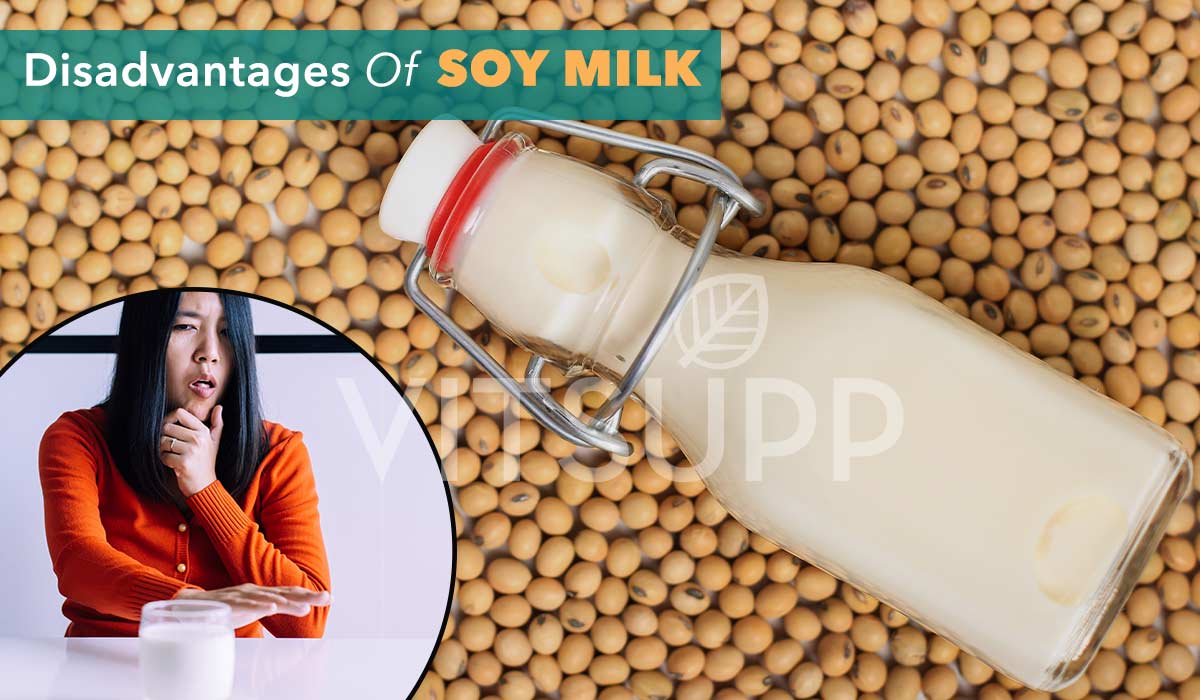
While soy milk is a nutritious alternative, there are a few potential disadvantages of soy milk:
- Allergies: Some people may be allergic to soybeans or protein and should avoid soy milk. Symptoms of a soy allergy can include hives, itching, swelling, and difficulty breathing.
- Hormonal effects: Soy contains phytoestrogens, which are plant-based compounds that can mimic the effects of estrogen in the body. While some studies have suggested that soy products may have health benefits, such as reducing the risk of certain types of cancer, others have raised concerns about the potential for soy to disrupt hormone levels and contribute to other health problems. Soy milk side effects in males may include an increased risk of prostate cancer and lower testosterone levels due to the phytoestrogens present in it.
- Genetically modified organisms (GMOs): Most soybeans grown in the United States are genetically modified to withstand pesticides; thus, they may contain GMOs. If you are concerned about consuming GMOs, look for those labeled as “non-GMO” or “organic.”
- Taste: Some people may find the milk does not taste good and may not like the taste of it.
- Nutritional value: There is not as much protein in soy milk as cow’s milk, and it is also not suitable for infants and young children.
Is It Safe To Drink Soy Milk?
When it comes to choosing a vegan alternative to cow milk that is lactose-free and has nutritional value, nothing can beat soy milk. This beverage is rich in protein, antioxidants, fiber, vitamins, and minerals. However, most of us wonder whether the consumption of soy milk is safe or not. Well, this answer lies in this section.
Drinking soy milk can be considered safe as long as you are not under any antidepressants or thyroid medications. It is also safe if you are not prone to soy allergy and hormone-sensitive conditions. However, it is not safe for babies under 1 year to consume soy milk. It is also advisable to consult with a healthcare provider before giving soyamilk to patients with terminal illnesses.
Who Should Avoid Soy Milk?
When we speak about soy milk composition, it does not include anything that can harm your body. Most of the ingredients in soy milk are good for health. However, this beverage must be avoided in certain circumstances.
- Individuals who are prone to soy allergy should avoid this beverage. If left untreated, this allergic reaction can escalate to anaphylaxis, a more severe health complication.
- People with thyroid disorders, such as iodine deficiency or hypothyroidism, should not opt for soyamilk.
- Babies aged below 12 months must refrain from consuming soy milk. Also, after that it is advisable to consult with your pediatrician before giving soy milk to your toddler.
- Hormone-sensitive conditions worsen after consuming soy milk. Individuals with endometriosis, uterine fibroid, or ER+ breast cancer must avoid this beverage.
- If you have enlarged breast tissue despite being a male, you must not consume soy milk.
- Soybean milk may cause gas and bloating. Hence, if you have irritable bowel syndrome or IBS, consumption of this beverage may worsen it. Also, people with any other sensitive digestive system should avoid soy milk.
- Certain antidepressants and thyroid medications may interact with soy milk. Therefore, anyone taking these medicines must refrain from having soy milk.
- If you do not prefer GMOs, then soy milk is not for you. You can opt for organic ones if you cannot survive without soy milk.
- If you are not vegan, can tolerate lactose, and do not like the nutty smell of soy milk – it is better to avoid it and go for dairy milk.
Therefore, if you belong to any of the above-mentioned categories, it is better to avoid soy milk and opt for any alternatives like almond milk.
Conclusion
Soy milk is a nutritious and versatile plant-based alternative to cow’s milk that can be easily incorporated into your diet. With its high protein and iron content, low fat and sodium levels, and lactose-free properties, it’s an excellent option for those who are lactose intolerant or have a cow’s milk allergy. Considering Soybean milk vs natural milk, while both can be consumed as a liquid, soy milk is a plant-based alternative made from soybeans, while natural one is a dairy product from animals.
Its history and production process, health benefits, and uses in cooking and baking make it an excellent choice for those looking to boost their protein intake and diversify their diet.
Following the tips discussed in this blog post, you can decide better when choosing the best products. Whether you’re looking to add more plant-based options to your diet or simply looking for a tasty and nutritious alternative, soy milk is a great choice.
Frequently Asked Questions
According to the American Institute for Cancer Research (AICR), one to two 8 ounces per day is safe and will provide many nutrients in soybean milk, just like cow’s milk. There are several benefits of drinking soy milk daily, which is why it is considered a healthy alternative. It is rich in protein, iron, and other essential nutrients. It is low in saturated fat and cholesterol-free. Hence it is excellent for heart health.
Additionally, it does not contain lactose, making it an option for those who are lactose intolerant. However, it is lower in calcium and must be fortified with calcium for growing children. Some studies suggest that soy products may have other health benefits, such as reducing the risk of breast cancer and supporting heart health. It is always important to check with a healthcare provider to determine if it is a good choice for your health needs.
Let us learn about soy milk vs cow milk.
1. Ingredients: Soy milk is made from soybeans and water, while cow’s milk is natural. It is also often fortified with vitamins and minerals such as calcium, vitamin D, and B vitamins, whereas cow’s milk contains these nutrients naturally.
2. Protein and Fat Content: Soy milk has a similar protein content to cow’s milk but less fat. It is a low-saturated fat that is free of cholesterol. On the other hand, cow’s milk contains saturated fat and cholesterol.
3. Lactose Content:Soy milk is lactose-free, making it a good option for lactose intolerant. Lactose soy milk can cause digestive issues for those who are lactose intolerant.
4. Flavor: It has a distinct, nutty flavor, while cow’s milk has a mild, slightly sweet taste.
Uses: It can be used in various ways, such as in cooking and baking, and as a substitute for drinks and cereal. Cow’s milk is also used in cooking and baking but is commonly consumed as a drink.
No specific time of day is best to drink. However, it is a good idea to incorporate it into your diet as a balanced meal or snack. Some people like to drink it with breakfast, while others prefer to have it as a midday or evening drink. Ultimately, the best time to drink soy milk is whenever it is most convenient for you.
As this beverage has good protein levels, it is better to have it in the morning or at least in the daytime. This way, it will be absorbed into your system while you are active. Some individuals feel gassy after having milk. Consuming it in the daytime will lower the chances of the same, allowing you to benefit from the nutritional ingredients of soy milk. For more information on healthy food choices, follow VitSupp.
Which one is healthier depends on various factors, including an individual’s dietary needs and personal preferences?
From a nutrient perspective, cow’s milk is a good source of calcium, vitamin D, and B12. It also contains high-quality protein and many other essential nutrients. On the other hand, it is a good source of protein and iron and is often fortified with calcium and vitamins D and B12.
It has low saturated fat and is cholesterol-free, making it a good choice for those looking to limit their intake of these nutrients. Is soy milk vegan? Or is soy milk considered a dairy product? It is a popular choice among vegans and vegetarians as it is a plant-based alternative. Some studies have found that it may have potential health benefits, such as being a source of protective antioxidants, may alleviate menopausal symptoms, and may support heart health.
However, it is worth noting that some people may be allergic to soy and should avoid any such products. Also, people with thyroid conditions should avoid this as it can interfere with the activity of the thyroid gland.
Though many factors concern cow milk vs soyabean milk, in the end, both can be a part of your healthy diet. It’s essential to consider your dietary needs and personal preferences when choosing one to include.Hence, between soybean milk vs natural milk, you must decide based on your health issues and preferences.
Like any other food or beverage, soy milk has advantages and disadvantages. Some of the disadvantages include the following:
1. Allergenicity: Some people may be allergic to soy, which can cause allergic reactions such as hives, rashes, and difficulty breathing.
2. Goitrogenicity: Soy contains compounds known as goitrogens, which can disrupt the function of the thyroid gland. This can be problematic for people with thyroid conditions, such as hypothyroidism.
3. Processing: Some products may be highly processed, which can lead to a loss of nutrients and the addition of artificial ingredients such as preservatives, sweeteners, and colors.
4. Taste: Some people find it tasteless and more appealing than cow’s milk.
Nutritional value: Soy milk is less nutritious than cow’s milk in some ways, such as being lower in calcium and vitamin D. To get the same amount of calcium, soy milk must be fortified with calcium.
It’s worth noting that many of these disadvantages can be mitigated by choosing organic, non-GMO, and minimally processed products. It’s also essential to consult with a healthcare professional before making any dietary changes, especially if one has a health condition or is pregnant or breastfeeding.
Gone are those days when vegans had to quit milk as it was dairy product. With the rise of veganism, the demand for plant-based cow milk alternatives increased, bringing forth various options. Soyamilk is one of them. As for what is soy milk made out of, soybean and water are the key ingredients. It is high in protein and fiber. It is great for weight management as it is low in calories. So, if you are looking for a healthy beverage that will help you to manage your body weight, you should opt for soyamilk.
If you inquire, “ What is soy milk good for? “, there can be plenty of pointers. It is good for your cardiovascular health. It helps to maintain a healthy cholesterol level. As soyamilk is rich in calcium, it is great for bone health. Also, soyabean has key antioxidants like isoflavones and saponins. These help to prevent damage to your body.
Most of us consume milk daily, as it is considered a part of a healthy diet. For individuals who are allergic to dairy products, they can have plant-based milk like almond milk or soy milk. Many of us wonder if we can consume these daily or if there are any restrictions. If you are wondering if soy milk healthy or not, then you are in for a surprise. It is a great source of protein, fiber, antioxidants, calcium, and other vitamins and minerals, making it a good choice for your daily diet.
Soy milk properties are nutritional and can ensure positive health outcomes for individuals. However, if you are allergic to soybeans, you must not opt for them. It is advisable for individuals with chronic health issues like high blood pressure or diabetes to seek healthcare consultation. Fat in soy milk can vary from sweetened to unsweetened ones. One cup of soyamilk contains approximately 4 gms of fat. This info on soy milk fat can help you determine whether you would like to incorporate soyamilk into your daily diet or not.
Soybean is a great source of protein and is considered a healthy food alternative. Soy milk is produced from soybeans. This plant-based alternative to cow milk is widely consumed by the vegans. However, it is better to avoid this beverage under certain circumstances. Not everyone can consume everything, and you must be aware of whether the food or beverage you intake is suitable for your health.
Sometimes, your immune system mistakes soy protein as a harmful element. This reaction causes soy allergy, which is similar to normal allergic reactions to some extent. However, if it escalates without intervention, it can cause more complex health issues, i.e. anaphylaxis. Therefore, if you are prone to soy allergy, you should drink soyamilk. Also, if you are pregnant, you must consult with your dietician before going forward with this. If you have concerns regarding soy milk additives, you can look for organic ones. Follow VitSupp for more information on healthy living.
If you ask, “ What is soy milk used for? “, the majority will point out its efficiency as a healthy beverage and alternative for animal protein. However, its benefits are beyond what meets the eye. The uses of soy milk are not limited to keeping you healthy from within. Soy milk is good for your skin, too. Studies have found that individuals who consumed a single cup of soy milk for two months noticed major improvement in their skin.
Soyamilk has numerous benefits for your skin, making you more interested in keeping it as a part of your daily diet. It boosts your skin’s health and enhances its texture. Your skin appears smooth as the wrinkles fade. If you tend to suffer from skin dryness, soy milk can be highly beneficial for you. It keeps your skin hydrated while leaving it with a whitening effect. Therefore, the nutrient-rich soy milk can make you fall in love with your skin all over again!
10. What are the pros and cons of soy milk?
Soy milk benefits and side effects must be assessed before determining the pros and cons. If you wonder, “ Is soy milk a good source of protein? “, you will be surprised to know the answer as most individuals assume only eggs, meats, and nuts can be good sources of protein.
If you ask, “Is soy milk a protein? “, the answer will be assertive. While it does not contain as much protein as cow milk, it still has a certain level of protein in it due to the base ingredient being soybean. Soy milk nutritional information is known to all. It is a great source of fiber and antioxidants, too. This healthy beverage can be helpful for managing high blood pressure, cholesterol, and healthy body weight.
Soy milk fat is an excellent source of omega-3 fatty acids. Added sugar in soy milk (sweetened) makes it essential to opt for the unsweetened one if you are looking for healthy ingredients only. As for the cons, it can cause soy allergy in certain individuals. It can create a hormonal imbalance. Also, some people might not find it tasty.
Soy milk contains sodium and potassium. The percentage of sodium varies from brand to brand. However, the soy milk potassium content remains similar for both fortified and unfortified options. Therefore, if you are consuming soyamilk, you are getting these two. 100 gms of milk is likely to contain 34 mg and 158 mg of sodium and potassium, respectively. Almond milk has a little more sodium than soybean milk.
Soy milk nutrition info is integral in understanding its health benefits. It is known that sodium and potassium are good for health. If these two are at adequate levels in your body, you will have perfect blood pressure, fluid balance, and nerve function. All these benefits outline the importance of consuming soy milk daily. Follow VitSupp for more.
There is a myth that soy milk have lactose, which is wrong. Soybean milk is naturally free from lactose. Therefore, you can consume it even if you are lactose-intolerant. Usually, dairy products have lactose, which does not allow individuals with lactose intolerance to go for those. Hence, they look for alternatives for the same. As the soyamilk is lactose-free, it is a great choice for them to go forward with.
Besides being lactose-free, soy milk is a good source of protein, fiber, antioxidants, vitamins, and minerals. The fortified soy milk contains calcium as well, making it ideal for your bone health. Therefore, if you are lactose-intolerant and looking for something filled with health benefits, then soybean milk is a must for you. However, any occurrence of soy already may prevent you from consuming this plant-based milk. Follow VitSupp for more information.
There was a time when only dairy milk was present in the market. In ancient China, soyamilk was invented thousands of years ago. For a long time, it was consumed as a key beverage. It was previously referred to as the poor man’s milk. However, it became popular much later. In the late 1970s, there was a rising demand for plant-based food items, which led to the popularity of soy milk. Eventually, it made its way to the West in the 20th century and turned out to be a hit among the masses.
In Paris, the first-ever soy dairy on Earth was founded in 1910. Slowly, it made its way to other continents and evolved further as more individuals became interested in it. Especially, the people who disliked the taste of dairy milk opted for this plant-based option. Hence, from its ancient Chinese roots to broad commercialization, soy milk has come a long way. With the vegan movement and the popularity of healthy food alternatives, this beverage is expected to grow further in the coming years.
A healthy body is all everyone desires. If you are a vegan, it becomes more difficult to ensure your body gets all the required elements that can be supplied to your body via food. Milk is one of the key sources of essential nutrients the human body needs. When you are vegan or lactose-intolerant, it leaves you with no other choice but to go with plant-based milk.
If anyone asks, “How healthy is soy milk? “, you must always remember that it is healthy in every way. As for the calories in a cup of soy milk, there are 80 and 100 for the unsweetened and sweetened ones, respectively. Hence, soybean milk is a low-calorie beverage that can be consumed daily, even if you are looking forward to maintaining a healthy physique. Also, soya milk nutrition goes beyond your imagination as it aids in weight loss. If you are having body mass-related issues, this beverage can help you to shed weight. The antioxidants, vitamins, and minerals help you stay healthy inside out.
Here, the actual milk refers to regular cow milk only. Regular milk from dairy is the first preference when you look for health benefits. It is filled with protein, calcium, and nutrients that can help to keep you healthy. If you are looking for a balanced diet, you must be aware of the differences between various foods and beverages. Soyabean milk and its comparison with natural milk is everything you must know if you are vegan or lactose-intolerant.
Everyone does not prefer Soyamilk due to its nutty taste. So, they can opt for dairy milk for a better taste. Also, when it comes to health benefits, actual milk ranks higher than milk derived from soybeans. It has all the essential nutrients and weighs more in health factors compared to all the other types of plant-based milk. Soy milk is better if you are prone to soy allergy, intolerant to lactose, and follow a vegan diet. Otherwise, it is advisable to opt for milk from dairy, which is considered healthier.
Animal-derived milk is regarded as a dairy product. It has the goodness of protein, calcium, vitamins A and B. It also contains lactose that is mostly present in dairy milk derived from cows, sheep, etc. If you prefer a lactose-free alternative, you can opt for soy milk. This is made from soybean and it is free from lactose, making it an ideal choice for you.
This plant-based milk is almost as good as dairy milk. When fortified with calcium, it can provide you with calcium as well. However, this would not be as much calcium as you get from cow’s milk. As it is plant-based, it is appropriate for a vegan diet. As soy milk is not derived from an animal, it cannot be termed as a dairy item. For more information, keep following VitSupp.
Soy milk is made from soybeans. Therefore, it is called ‘soy’ milk, which is a short form of soybean. Similarly, sometimes it is referred to as soyamilk, where the short version is derived as ‘soya’. The variation in the pronunciation may depend upon one’s accent or talking style. If you prefer calling it ‘soya’ over ‘soy’, then it is going to be ‘soyamilk’ for them. In other words, both of these variations are used to indicate soyabean milk.
Regardless of the word ‘soy’ or ‘soya’, both of them are plant-based alternatives to dairy milk that are derived from soybeans. Hence, the soy milk and soya milk difference is baseless. You can check Amul soya milk price per litre if you want to get an insight on the pricing. Follow VitSupp for more information on healthy food choices.
When you opt for soy milk or any other similar types of healthy beverages, fat is one of the key factors to consider. Soyamilk is more fatty than almond milk but less than dairy milk. Fat in soy milk contributes to its creamy texture. However, if you follow a low-fat diet, you should refrain from consuming soy milk. It has a moderate fat content, making it a balanced beverage for you. If you are looking forward to maintaining a healthy weight, soy milk is the right choice for you. The unsweetened one will be a healthier version as it does not contain any added sugar or additives. For more information, keep following VitSupp.

